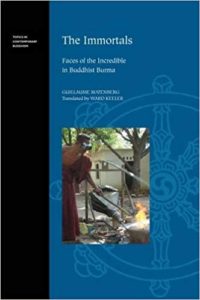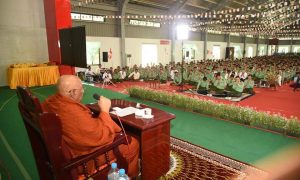 “It is difficult to characterize this fascinating book,” George Tanabe writes in his short preface to The Immortals: Faces of the Incredible in Buddhist Burma(University of Hawai’i Press, 2015), “Not just because it concerns thousand-year-old Burmese Buddhists who fly but also because its author has chosen, almost by necessity, unusual procedures for studying and writing about this strange topic.” Indeed, it is not only Guillaume Rozenberg’s topic but the book itself that is unusual and intriguing. First published in French and now available in English thanks to the work of Ward Keeler, this is the second in a planned tetralogy on the extraordinary in Burmese Buddhism. Variously a thrilling narrative of raining coconuts and candles, a how-to guide for budding alchemists, and an account of people rendering their bodies impervious to swords and blows, at its twists and turns The Immortals also offers uncommon insights into the relationship of belief to political and social order. At the same time, it reflects frankly on the odd role of the author in not merely recording but somehow also participating in the fashioning of this cult of the incredible in an otherwise unremarkable village in Burma’s Buddhist heartland.
“It is difficult to characterize this fascinating book,” George Tanabe writes in his short preface to The Immortals: Faces of the Incredible in Buddhist Burma(University of Hawai’i Press, 2015), “Not just because it concerns thousand-year-old Burmese Buddhists who fly but also because its author has chosen, almost by necessity, unusual procedures for studying and writing about this strange topic.” Indeed, it is not only Guillaume Rozenberg’s topic but the book itself that is unusual and intriguing. First published in French and now available in English thanks to the work of Ward Keeler, this is the second in a planned tetralogy on the extraordinary in Burmese Buddhism. Variously a thrilling narrative of raining coconuts and candles, a how-to guide for budding alchemists, and an account of people rendering their bodies impervious to swords and blows, at its twists and turns The Immortals also offers uncommon insights into the relationship of belief to political and social order. At the same time, it reflects frankly on the odd role of the author in not merely recording but somehow also participating in the fashioning of this cult of the incredible in an otherwise unremarkable village in Burma’s Buddhist heartland.
The book’s translator Ward Keeler joins New Books in Southeast Asian Studies to discuss scepticism and believing, vulnerability and masculinity, public order and military rule, Melford Spiro and the study of supernaturalism, anthropology’s crisis in representation, expository French style and the third person as rhetorical device, and language learning as anthropological exercise.
Listen to the podcast here:
(Duration: 41:49 — 38.3MB)
You may also be interested in:
Erik Braun The Birth of Insight: Meditation, Modern Buddhism, and the Burmese Monk Ledi Sayadaw
Lawrence Principe, The Secrets of Alchemy
 Facebook
Facebook  Twitter
Twitter  Soundcloud
Soundcloud  Youtube
Youtube  Rss
Rss 

